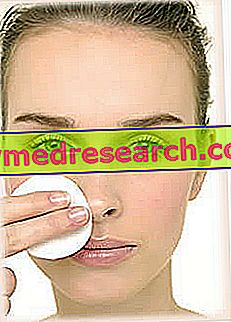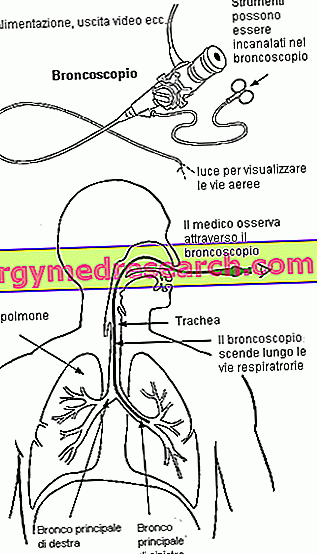Oily skin is a widespread aesthetic disorder, the result of an exaggerated production of sebum by the sebaceous glands distributed on the epidermis. At the sight, the oily skin appears shiny and oily, sometimes even dehydrated; the complexion of the skin is dull and, to the touch, it appears irregular or rough.

The causes that are at the origin of oily skin reside essentially in the alteration of the endocrine balance: not by chance, oily skin reflects a typical condition of puberty, which however can also extend into adulthood dragging with itself psychological repercussions not underestimated . An overproduction of the 5-alpha reductase enzyme in hair follicles can also excessively stimulate sebum synthesis. Finally, even the administration of drugs such as anabolic steroids, cortisone drugs, danazol, and some diseases (eg polycystic ovary syndrome) can promote the appearance of oily skin.
What to do
- Use neutral detergents, with a pH of 4.5-5.5 and not excessively aggressive
- When oily skin also has acne or blackheads, the recommended remedy is to use specific detergents that can counteract sebaceous hypersecretion, moisturize the skin, promote pore closure and fight bacterial proliferation
- Clay masks are ancient but very effective remedies against oily skin. The dermo-purifying and adsorbent properties of the clay are in fact very suitable for improving the appearance of oily skin. For the same reason, thermal mud packs are equally useful.
- Think positive: even oily skin can offer some small advantages. Compared to dry or normal skin, for example, oily skin tends to "age more slowly": oily skin tends to hinder the formation of wrinkles in some way, making them less noticeable
- Always remove creams or other body products (especially those based on oil) before going to sleep
- Pay particular attention to cleaning the face: after cleansing, it is recommended to apply an astringent lotion free of alcohol on the skin
- Sensitive and oily skins require further care: the products should be chosen with the advice of an expert to avoid as much as possible to irritate and redden the skin unnecessarily
- In the presence of oily and acneic skin, it is recommended to apply a specific acne cream one or more times a day, formulated with astringent, dermo-purifying and sebum normalizing active ingredients. However, it is advisable not to exceed the daily applications of the product
- Very oily skins require deeper treatments: for this purpose, the steam jets and the subsequent application of an exfoliating product are the most suitable remedies. The steam dilates the pores, preparing the skin to receive the functional active ingredients that make up the exfoliating cosmetic
- Acne-prone oily skins require periodic application of specific acne creams
What NOT to do
- Wash three or more times a day: oily skin does not appreciate frequent washing, so it is advisable not to use too much water and soap
- Apply substances with distinctly astringent and delipidizing properties several times a day: an excess of "cleansing" of oily skin could generate a rebound effect, such as to further increase sebum production
- Use creams, ointments or other oily / irritating cosmetic formulations
- Expose yourself to the sun after a treatment with exfoliating action creams
- Expose yourself to the sun without UV-protective creams
- Apply to the skin of the face very aggressive make-up products: oily skin, which does not like this kind of products, needs delicate cosmetics, even better if specific for oily skin
- Smoking: smoking can stick to the skin, making it visibly more greasy
What to eat
- Take lots of fruit and vegetables, as it is rich in antioxidants (vitamin C and E)
- Prefer foods rich in omega 3 (fish such as cod, salmon, mackerel) or omega 6 (dried fruit in general)
- Yes to whole grains
- Prefer white meats; limit the consumption of red meat
What NOT to Eat
- Animal fats (limit consumption)
- alcohol
- Refined flour and sugar
Natural Cures and Remedies
- Although they cannot completely eradicate the disorder, natural remedies for oily skin can still improve the appearance of the skin more or less clearly. Undoubtedly, toners with an astringent action, formulated with essential oils, are preferable. The recommended bioaromas against oily and impure skin are:
- Rose water: astringent properties
- Witch hazel ( Hamamelis virginiana ): the astringent and vasoconstrictor properties of this extract are indicated for oily, impure skins and with excessive sebaceous secretion
- Chamomile ( Matricaria recutita ): local anti-inflammatory, antimicrobial, healing and dermo-purifying properties.
- Cypress ( Cupressus sempervirens ): astringent, anti-inflammatory and balsamic properties
- Eucalyptus ( Eucalyptus globulus ) and mint ( Mentha piperita ): refreshing properties
- Lavender ( Lavandula vera ): Anti-inflammatory and balsamic properties
- Sulfur: sulfur-based products are often recommended as a support to drug therapies for the treatment of oily and acneic skin
- Aloe vera (Aloe vera): anti-inflammatory and soothing properties, indicated for oily and acne-prone skin
Pharmacological care
DRUGS REQUIRING A MEDICAL Prescription
- When oily skin results in a pathological problem, it is possible to intervene with specific medicines to try to normalize the production of sebum, removing the disease that arises at the origins. For example, women suffering from polycystic ovary syndrome who also complain of very oily and acneic skin can follow hormonal therapy to try to mitigate their symptoms. The drugs most indicated for this purpose are:
- oral contraceptives (eg contraceptive pill, contraceptive patch, IUD spiral etc.)
- progesterone derivatives
- oral antidiabetics
- Products formulated with azelaic acid or benzoyl peroxide are effective remedies against oily and acneic skin
- The products formulated with alpha / beta-hydroxy acids are indicated to remedy an oily and acneic skin. The exfoliating action of malic acid, cogic acid, tartaric acid and salicylic acid is very indicated to remove dead cells present in the superficial layer of the skin, stimulating at the same time the cellular renewal of the epidermis
Prevention
- Avoid exposure to the sun as much as possible (especially in the absence of sun protection): UV radiation worsens the clinical picture of oily skin
- Use mild or specific detergents for oily skin
- Avoid too frequent washing
- To prevent excessive deposits of sebum on the skin, it is recommended to avoid as much as possible the polluted places and the smoke (even the passive one)
In general, it is not possible to prevent oily skin: it is still important to put into practice all the valuable advice and precautions to prevent sebaceous hypersecretion from turning into an even more serious problem.
Medical treatments
- Except for the pathological cases of oily skin (dependent for example on pharmacological treatments, underlying diseases or alterations of hormonal balance), it is not necessary to intervene with specific medical treatments
- When oily skin is a real problem, it is recommended to consult a dermatologist to find out the cause of the disorder



